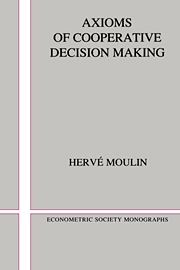11 - Aggregation of preferences
Published online by Cambridge University Press: 05 January 2013
Summary
Overview
A voting rule compromises between the voters' conflicting claims by picking a single outcome from each preference profile. In his very influential book, Arrow [1963] proposed a more ambitious goal to the social planner, that of aggregating the preference profile into a complete ordering of outcomes. This ordering is meant to reflect the level of social welfare at any one of the outcomes, including the suboptimal ones. If exogenous constraints prevent the planner from implementing a socially best outcome [i.e., a maximal outcome of the social welfare ordering (SWO)], the social ordering allows him to distinguish the welfare-improving changes of outcomes from those that decrease social welfare.
The thrust of Arrow’s approach is his axiom independence of irrelevant alternatives (AHA). It states that the (social) welfare comparisons within any given subset of outcomes should not depend upon individual preferences outside this subset. Hence, AHA limits the information one may use when comparing two outcomes a and b: The voter’s preferences among these two (who prefers a to b, who prefers b to #, who is indifferent?) should be all that matters to form the social preference about a, b. The bite of the axiom is to reduce the task of defining an ordering of all outcomes to that of solving all pairwise comparisons and to check if those comparisons together form a transitive SWO. But pairwise comparisons are easy to solve.
- Type
- Chapter
- Information
- Axioms of Cooperative Decision Making , pp. 283 - 316Publisher: Cambridge University PressPrint publication year: 1988



